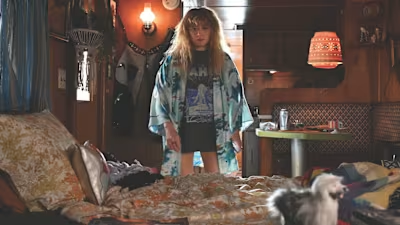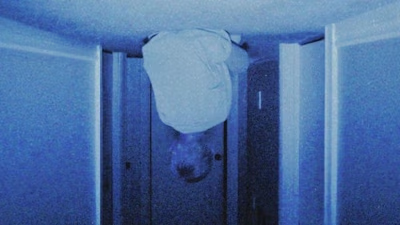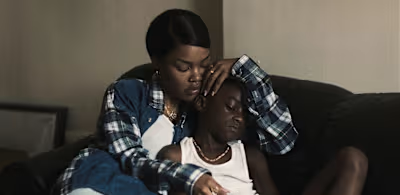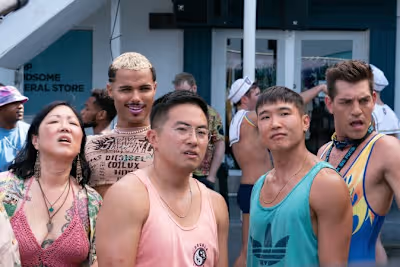Jesse Eisenberg and Finn Wolfhard on the Fake Generation Gap an…
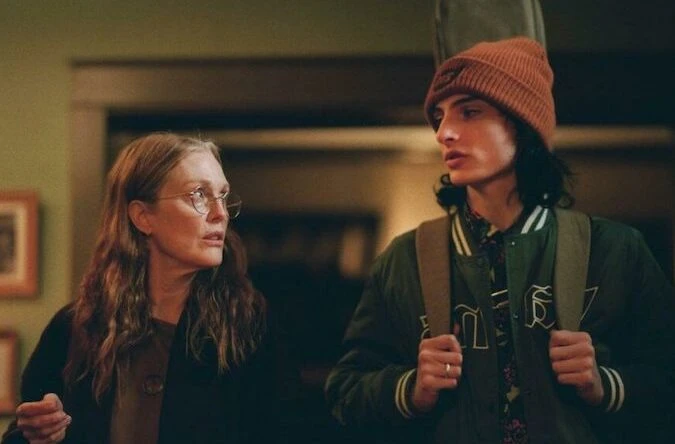
When You Finish Saving the World director Jesse Eisenberg’s story began as a series of monologues from a father who was having trouble connecting with his newborn son.
That’s until it became an Audible project. What started as an audio play about three individuals working to understand each other (with voice performances by Jesse Eisenberg, Kaitlyn Dever and Finn Wolfhard) became a two-hander movie, starring Wolfhard and Julianne Moore.
“I wasn’t writing specifically for the medium of audio, it started like a character piece,” Eisenberg told MovieMaker in conversation with Wolfhard about their new movie. “I always write from the character’s perspective before I write the story. It makes me feel most comfortable writing the characters after I’ve lived with them for a while. So that’s why the jump from audio to movie felt natural.”
Evelyn Katz (played by Julianne Moore) has built her life around helping people in crisis, but she struggles to connect with her son Ziggy Katz (Finn Wolfhard), an internet star who is oblivious to any of the problems in the lives of his 20,000 subscribers.
The central concept of When You Finish Saving the World comes from one of Eisenberg’s personal dilemmas: Is art in conflict with justice? He tells us about the conflict of working in an industry that “rewards things that are sometimes very vain and self-serving.”
Jesse Eisenberg and Finn Wolfhard sat down with MovieMaker to discuss the impact of fellow A24 movie Everything Everywhere All at Once and how it laid the groundwork for theirs. Wolfhard also explains how he thinks the generational divide between Gen Z and their parents and grandparent’s generation is mostly made up, and Eisenberg talks about spending $5,000 to create a deepfake of Finn, and both actors discuss the humor and awkwardness of filming Finn’s masturbation scene (beware spoilers in their answer).
Joshua Encinias: When You Finish Saving the World debuted at Sundance last year, went to Cannes, and is debuting almost a year later. What was it like to sit on the movie for a year?
Jesse Eisenberg: Oh, it’s just the most typical thing. I’ve been through situations where you make a movie and it comes out five years later. Then this TV series I did, Fleishman Is in Trouble, comes out four months after we finished it. Waiting involved talking to the studio every day and wondering, “When are people going back to movies like this?” It was going to come out in the summer, but last summer people weren’t going to movies geared toward the arthouse crowd as much. That’s why I understood the wait. My kind of philosophy in life and career is to just constantly move forward so you don’t go crazy thinking about how people are receiving or watching previous things that you’ve done.
Joshua Encinias: It feels kind of right that Everything Everywhere All at Once came out before your movie. Everything Everywhere seems like the first movie Gen Z can really call their own, and while old guard of movie industry might respect it, they don’t seem to enjoy it. But that movie laid the groundwork for some themes your movie explores.
Finn Wolfhard: I totally get that and I know exactly what you mean. I was saying that the other day to people about Everything Everywhere All at Once. I totally agree with you. I would imagine it’s kind of how people felt when The Evil Dead movies came out where it’s like, “Oh, this is funny and goofy, but also like brilliant and genius, and young people can make movies, too, and not feel pandered to in any way.”
Joshua Encinias: You make a lot shows and movies people of your generation love, and I’m curious: Do you ever feel like it’s not understood by the industry? Or do they get it because the marketing tells them your generation will like it?
Finn Wolfhard: That’s something I struggle with a lot. Being a young actor, I think you always feel pandered to by older people, or older people making films. I just don’t think that there’s much of a generational divide. Or there doesn’t have to be much of a generational divide — I think a lot of people make it for themselves. I think there wouldn’t be as much of a generational divide if people just wrote what’s specific to them. It wouldn’t feel pandering because it just feels like their story, rather than trying to perform for someone and trying to write something for another age group that you don’t know anymore.
Joshua Encinias: Do you think it’s harder for an older writer to make something that’s authentic to them and appeals to younger viewers?
Finn Wolfhard: It’s definitely possible. Jesse just did it, but that’s because it’s personal to him. I think the problem with a lot of things that come out nowadays is that they’re trying to spoon feed my generation. And the answer to that is because of phones. The reason people do that is because there’s no reason. Our generation uses social media and stuff more than older people: that to me isn’t much of a generational divide. That’s not very interesting. But I think what’s interesting about our movie is that it isn’t much about a generational divide. It’s more about two people that are exactly the same but have completely different interests and thoughts about the world. One is someone who’s so focused on social work and change and working at a domestic violence shelter, and the other one is focused on entertaining, making money for kids his own age. And they’re also stubborn in their own ways about their thing and about their job. But they’re exactly the same. They think about their jobs exactly the same. To me, I don’t think of it as a generational divide. I think of it more as like two people that are on different pages. I think a lot of people use “generational divide” because it’s a big buzzword nowadays.
Joshua Encinias: Jesse, you’ve said there’s an unresolvable battle between art and social justice inside of you. What is the conflict?
Jesse Eisenberg: It feels so weird to be in a profession and an industry that often celebrates such vanity. Most actors I know feel conflicted and off put by that kind of thing, which is the normal reaction. My wife is an activist and a teacher so I’m confronted on a daily basis with trying to figure out the value of my work versus the versus the work of the people around me. I often feel like I come up short, like I’m celebrated for being on a show or something and it just feels a little strange. I assume that a lot of people who work in the arts and work in an industry that oftentimes overpays and celebrates and rewards things that are sometimes very vain and self-serving feel that way. I know Finn feels conflicted by it. I know Julianne Moore feels conflicted by it. Almost every sensitive, thinking actor has that feeling because it’s a very strange industry. It’s very beautiful and wonderful and does a lot of good by telling stories, but it’s also this very strange thing that is flawed.
Joshua Encinias: Finn, your character Ziggy has a platform of 20,000 followers who listen to his music. You’re also a musician but with a way bigger platform, so is it harder for people to remove how they know you from movies and TV to hear your music for what it is?
Finn Wolfhard: I think it’s easy as an actor to be pigeonholed and it makes total sense why. But I’m not really concerned with staying relevant in any way. I’m less self-promotional. I used to be when I was younger, because I just thought that’s what you had to do. If you’re like a famous young actor, you have to move to L.A., you have to post on social media all the time… it doesn’t matter. You can do whatever you want. And for me, that was a really important lesson to learn — that you don’t have to do what you think is the right thing to do in the kind of job that we have. Especially with posting stuff about my music. I write a lot of music and I have a lot of stuff that I haven’t even released, that I just keep for myself because I just like doing it. And some stuff might get released. But a lot of the time I don’t find much charm in having to feel the urgency to share everything with everyone all the time.
Jesse Eisenberg: Finn’s music is so great that within two seconds, you realize this is not like the side project of somebody who’s trying to call himself another multi hyphenate. He’s incredibly talented to the point where the executives at A24 were finding more of his music to put in the marketing materials because it was just great music. So there’s a song in the trailer by Finn that they thought just worked really well. And you know, these are people who are making like the best trailers in the world. So Finn is not somebody dabbling in music who happens to be famous from something else.
Joshua Encinias: At end of the movie, Evelyn’s going through Ziggy’s YouTube channel and she stumbles across a very old video of Ziggy and it looks just like Finn. So, Finn, did you have a Youtube channel back in the day?
Finn Wolfhard: That was for a nonexistent channel that I started in my head. I made that because I was very much into YouTube and blogging at the time and all that stuff and watching all these YouTubers, and so I wanted to try pretending to be one. Jesse asked for videos of me as a kid and I sent him that.
Jesse Eisenberg: It was the cutest thing I’d ever seen. We needed to change the clip so we hired the Belgian brothers who did the Tom Cruise deep fake. We basically hired them to do a deep fake of Finn, which in retrospect feels icky. Then we hired a voice-alike. We hired a young actor to do a voiceover as Finn to do those lines. I think we’re probably at the forefront of a a big change. I imagine that people will make these all the time.
Finn Wolfhard: Terrifying. Full full blown roles.
Jesse Eisenberg: I mean, it costs us $5,000. Which was a discount because we’re a small film, but the obstacles to this technology are not big.
(SPOILERS FOLLOW.)
Joshua Encinias: There’s a scene in the movie where Ziggy masturbates to a poem written by Lila (Alisha Boe). Jesse, how did you approach directing the scene?
Jesse Eisenberg: When I told my wife when we were shooting this particular scene, she was like, “Well, you can’t. Can you stop? You can’t do that.” I was like, “Oh, no, I think I can. I’ve done it myself in movies.” And she said, “But you can’t do that to another person.” I was like, “Oh, well, we have it scheduled.” You know, I mean, you know, it’s, it’s…
Finn Wolfhard: I mean, it’s a closed set. There wasn’t a whole crew watching.
Jesse Eisenberg: You were completely clothed in the scene. It should almost be like a bittersweet thing. Instead of masturbating to internet porn, he’s reading the poem. There’s a sweetness so it didn’t feel salacious. I’m incredibly uncomfortable around… I’ve been in sex scenes as an actor, but I’m incredibly uncomfortable for the other people involved. Even if I make 1,000 movies, I think there would never be a shin, a leg, or and an arm showing in anything I make. Everybody will be in long sleeves, parkas, hats and glasses, because I feel uncomfortable putting people in that position. But this felt like it was so sweetly part of the story, and in some ways, more heartening than salacious.
Joshua Encinias: Finn, what was filming the scene like for you?
Finn Wolfhard: It was absolutely salacious! I was saying that from day one. [Laughs.] No, I was fine with it. I thought it was a hilarious part of the script. This kid is so charged by this that he feels the need to just use the poem. I remember it was literally just me and our camera operator, Jake. We had meetings about it, it was taken seriously, and ended up being totally fine and ridiculous.
When You Finish Saving the World is in theaters Friday.
Main image: Julianne Moore and Finn Wolfhard in When You Finish Saving the World.
Share:
Like this project
Posted Sep 22, 2023
When You Finish Saving the World director Jesse Eisenberg and star Finn Wolfhard discuss the fake generation gap and poetic masturbation.
Likes
0
Views
177


